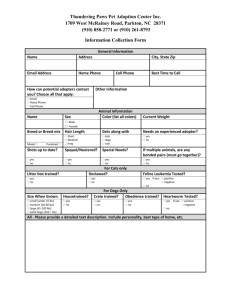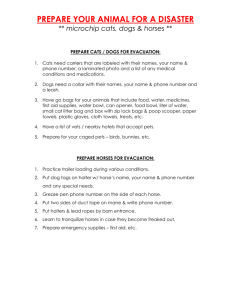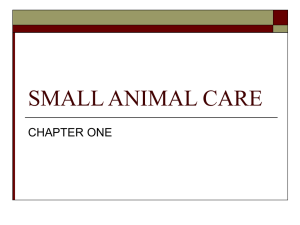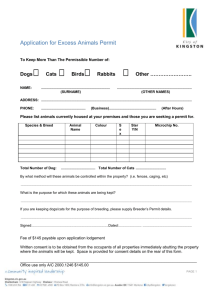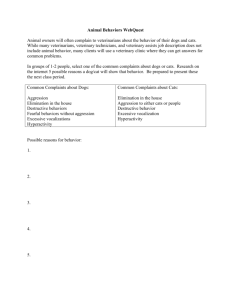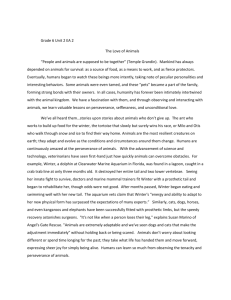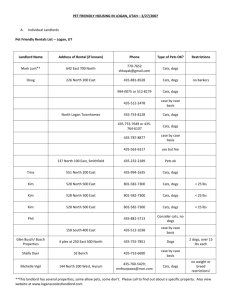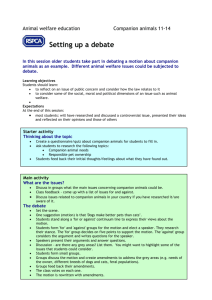Essential Capabilities of CASPCA Volunteers
advertisement
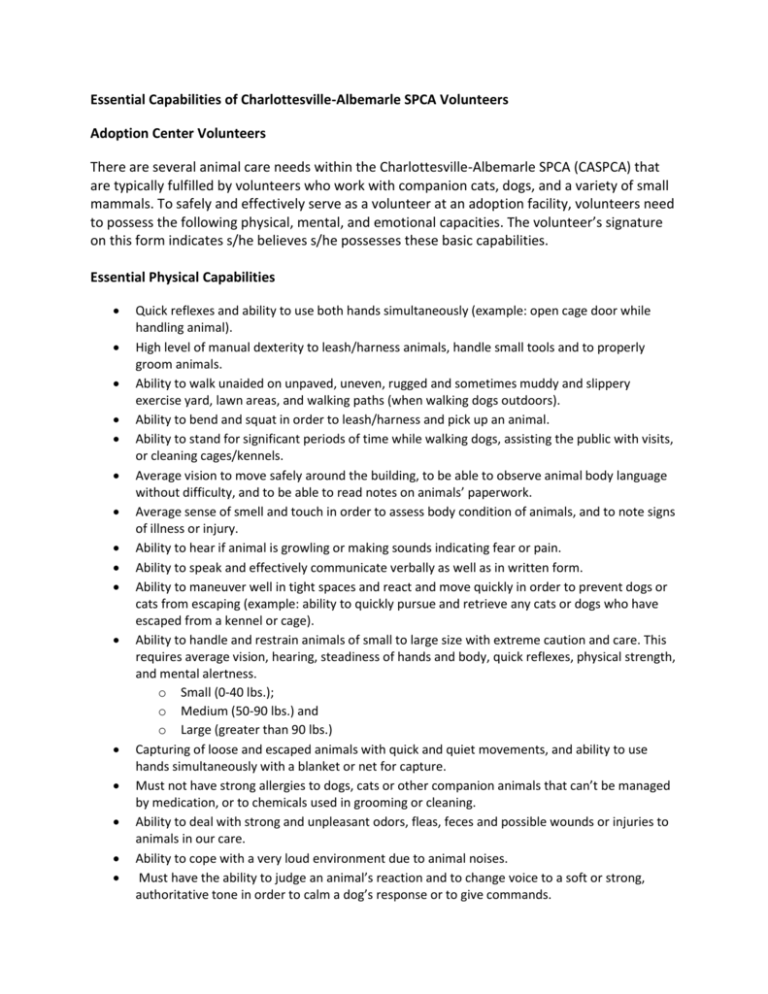
Essential Capabilities of Charlottesville-Albemarle SPCA Volunteers Adoption Center Volunteers There are several animal care needs within the Charlottesville-Albemarle SPCA (CASPCA) that are typically fulfilled by volunteers who work with companion cats, dogs, and a variety of small mammals. To safely and effectively serve as a volunteer at an adoption facility, volunteers need to possess the following physical, mental, and emotional capacities. The volunteer’s signature on this form indicates s/he believes s/he possesses these basic capabilities. Essential Physical Capabilities Quick reflexes and ability to use both hands simultaneously (example: open cage door while handling animal). High level of manual dexterity to leash/harness animals, handle small tools and to properly groom animals. Ability to walk unaided on unpaved, uneven, rugged and sometimes muddy and slippery exercise yard, lawn areas, and walking paths (when walking dogs outdoors). Ability to bend and squat in order to leash/harness and pick up an animal. Ability to stand for significant periods of time while walking dogs, assisting the public with visits, or cleaning cages/kennels. Average vision to move safely around the building, to be able to observe animal body language without difficulty, and to be able to read notes on animals’ paperwork. Average sense of smell and touch in order to assess body condition of animals, and to note signs of illness or injury. Ability to hear if animal is growling or making sounds indicating fear or pain. Ability to speak and effectively communicate verbally as well as in written form. Ability to maneuver well in tight spaces and react and move quickly in order to prevent dogs or cats from escaping (example: ability to quickly pursue and retrieve any cats or dogs who have escaped from a kennel or cage). Ability to handle and restrain animals of small to large size with extreme caution and care. This requires average vision, hearing, steadiness of hands and body, quick reflexes, physical strength, and mental alertness. o Small (0-40 lbs.); o Medium (50-90 lbs.) and o Large (greater than 90 lbs.) Capturing of loose and escaped animals with quick and quiet movements, and ability to use hands simultaneously with a blanket or net for capture. Must not have strong allergies to dogs, cats or other companion animals that can’t be managed by medication, or to chemicals used in grooming or cleaning. Ability to deal with strong and unpleasant odors, fleas, feces and possible wounds or injuries to animals in our care. Ability to cope with a very loud environment due to animal noises. Must have the ability to judge an animal’s reaction and to change voice to a soft or strong, authoritative tone in order to calm a dog’s response or to give commands. Ability to reach cabinets and cages at least six feet in height, using a step stool as needed. Possess immune system strong enough to tolerate exposure to zoonotic diseases such as ringworm and mange. Essential Mental Capabilities Ability to understand, remember and follow instructions and procedures. High level reading, writing, spelling and communication skills (example: understand words such as quarantine, euthanize and other common industry-related terms), and a mastery of the English language. Possess problem-solving capability. Ability to observe and evaluate health and behavioral problems that are revealed during socialization and to notify management and staff. Must be aware of potentially dangerous situations when working with the animals, must be able to remain calm with animals who are upset; behave sensitively and confidently; show good judgment and act appropriately in these situations. Essential Emotional Capabilities Ability to cope with unexpected animal behavior without assistance and to calmly seek assistance. Ability to cope with a highly emotionally charged environment with some animals that are homeless, abandoned and/or abused, as well as the reality that some of the animals in our care may be euthanized. Ability to understand the CASPCA’s policies and positions regarding companion animals, animal control, and other key animal welfare issues and an ability and willingness to appropriately and accurately represent those policies when interacting with the public or otherwise representing CASPCA. Level of Supervision Once trained, must be able to work with minimal supervision, yet must recognize limitations in knowledge and abilities, and ask for help when needed. Should be able to work independently for long periods of time, as well as work within a team atmosphere with other volunteers or staff. Please indicate any reasonable accommodation you may need in order to meet the essential capabilities of your volunteer position at the CAPSCA: _________________________________________________________________________________ _________________________________________________________________________________ _________________________________________________________________________________ _________________________________________________________________________________ _________________________________________________________________________________ ____________________________________ Name (print) ______________________________________ Name (sign & date)

